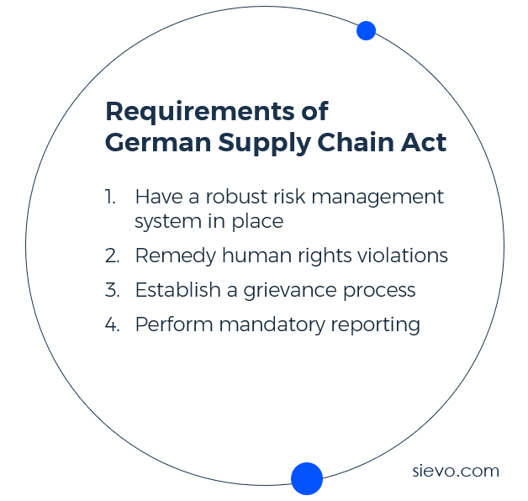The German Supply Chain Act (The German Act on Corporate Due Diligence Obligations in Supply Chains or SCDDA)--in German Lieferkettensorgfaltspflichtengesetz (LkSG)--requires large companies to identify, prevent, and address human rights and related environmental violations within their own and their direct suppliers’ operations.
From January 1, 2023 onwards, large companies operating in Germany will be required to ensure certain social and environmental standards are observed throughout their supply chain.
The SCDDA is the first legislative step to oblige German companies to protect people and the environment adversely affected by their global supply chains.
But how will this act affect procurement in practice? In this article, you'll find everything you need to know about the German Supply Chain Act and how you can best prepare.
We can see how large German businesses are taking this upcoming act and its' requirements very seriously.
Companies are collecting information from their suppliers to understand the current situation. After this mandatory step is accomplished, the companies tend to ask themselves: how we could use this data for business value, what to prioritize and where to start? That's where the shift towards Procurement Analytics usually happens.
Which organizations are affected by the act?
The regulations will initially apply to around 600 German companies. It applies to companies with at least 3,000 employees with a head office, administrative seats, or statutory seats in Germany.
Employees are considered as any worker with an employment contract longer than 6 months.
From 2024 the lower limit will be 1,000 employees and the number of companies affected will increase to around 2,900.
The Ministry of Economic Affairs rejected the originally planned lower limit of 500 employees because of the feared negative consequences for the German economy.
What is the purpose of the act?
The Act aims to ensure companies continually conduct human rights and environmental due diligence. The duty to comply with environmental regulations is primarily intended to prevent harmful effects on people.
What activities does the act cover?
The Act covers any activity, including the production of products and the provision of services, regardless of whether the activity is conducted in Germany or at a foreign location.
The actions required by companies vary based on the nature and scope of their business and their ability to influence a related entity that is violating the rules.
Other considerations include the extent and expected severity of the violation, the possibility of reversing the error, and whether the violation is likely to reoccur.
Compliance with the reporting requirements will depend on the active support and commitment of Tier 1 suppliers, and in some cases, Tier 2 suppliers (suppliers’ suppliers).
What are the penalties for violations of the act?
Fines for violations of due diligence and reporting obligations of can be up to EUR 8 million, depending on the nature and gravity of the violation.
Companies with an average annual turnover of more than EUR 400 million may be fined up to 2% of their average annual turnover if they fail to take remedial action targeted at a direct supplier.
Companies may also be excluded from public tenders for up to three years.
What are the requirements of the act?

1. Supply chain risk management
Companies affected will need to adapt their risk, governance, and compliance processes to identify risk areas in human rights and environmental damage.
This applies to their own business activities and those in their extended supply chain.
Companies should gain compliance, to the best of their ability, from their suppliers through their code of conduct.
The risks that companies must address include internationally recognized human rights conventions and sustainability issues:
- Forced labor
- Child labor
- Discrimination
- Violations of freedom of association
- Unethical employment
- Unsafe working conditions
- Environmental degradation.
Based on the analysis of current risks, companies must take appropriate preventive or remedial measures.
In the procurement world, this means reviewing the supplier selection and supplier monitoring processes and having a clear supplier communication process with defined codes of conduct.
2. Remedying human rights behavior
Companies must establish a policy statement on their human rights strategy which must define their procedure for abiding by human rights and environmental due diligence obligations.
The policy should also define the process to remedy human rights and related environmental violations.
Want to learn how to make a sustainable procurement policy? Start here with our complete guide.
3. The grievance process
Companies must make sure they provide ways for affected persons to file a formal written complaint alerting the company to known human rights or environmental violations.
The Act defines human rights risks broadly. Alongside child and forced labor, it covers freedom of association, inequality, withholding of an adequate wage, land deprivation, torture and cruelty, and inhumane or degrading treatment.
4. Documentation and reporting
A report on the status of the human rights-related due diligence obligations must be documented and published annually. This report must also be submitted to the competent authority.
A government authority will monitor every company’s adherence to the new requirements.
How to be compliant with the German Supply Chain Act?
With all the requirements out of the way, here are 3 steps you want to take before the act hits:
1. Review the current AS-IS situation and ensure that your database has the required basic information. You need to have a complete list of your direct suppliers, including their locations and contact details, the nature of their businesses, and their worker profiles.
2. Conduct a risk assessment of each supplier starting with key partners. Consider whom they employ, where they are located, and what employment conditions their people work under. Migrant workers are a particular risk area.
3. Advise your partners and suppliers of this new legislation and what their obligations to you are. Suppliers must confirm that they adhere to current labor, health and safety, and environmental legislation and have documents to prove it.
How Sievo can help you in meeting the requirements of the LkSG?
We at Sievo want to help you be prepared for the Act. Here are some of the ways procurement analytics can put you in a position to succeed.
Getting insights from your data for action
-
Identifying informational gaps in your data.
-
Helping you identify immediate and medium-term focus areas to be compliant with the Act.
-
Mapping your current spend and supply base and identifying your key suppliers.
-
Adding contract data to spend analysis to uncover non-compliance.
Identifying risks
- Analysing the relevant human rights and environmental risks across your own operations.
- Identifying the risks inherent in your supplier partners across divisions, sectors, and locations.
- Identifying high-risk hot spots in your supplier base.
Choosing the right suppliers and developing suppliers
Tracking and reporting your progress
- Helping you control category-specific CO2 footprints and manage them effectively.
- Measuring your CSR strategy development against defined targets.
Header photo by Patrick Rosenkranz (unsplash.com)




